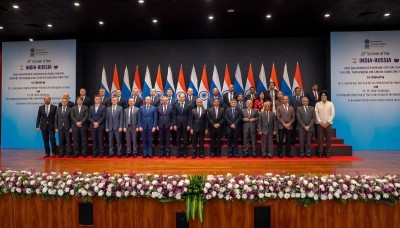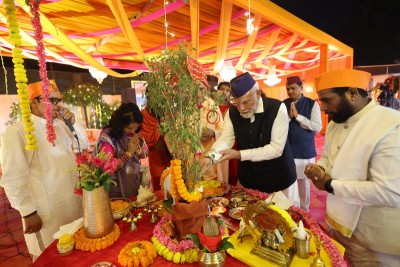 Khalistan
Khalistan
Manipulation and misrepresentation: The dangers of supporting Khalistan lobbying
In the wake of recent electoral victories by a couple of radical leaders in Punjab, a dangerous trend has emerged with Pro-Khalistan Elements leveraging these outcomes to gain legitimacy and mobilize support in mainstream politics across the West.
This surge in extremist influence poses a significant threat that the international community, particularly Western democracies, must urgently address.
These elected leaders pledged to uphold the Indian Constitution and pursue their goals within its legal framework.
However, this commitment is being misrepresented by certain groups in Western nations, who are promoting a narrative of widespread resentment within the Sikh community and support for Khalistan.
These elements are using the electoral victories to validate their cause, creating a misleading impression that the rise of Khalistan ideology in Punjab reflects broader support for separatism, which could not be farther from the truth.
The electoral victory of these radical candidates is attributed to a shift in Panthic votes from the Shiromani Akali Dal (SAD) to these radicals, driven by dissatisfaction with the SAD’s handling of sacrilege incidents.
Their victories are in no way an endorsement of extremist ideologies. The SAD’s decline in Panthic appeal has merely opened the door for certain factions to realign voter support in their favor.
The defeat of candidates like Simranjit Singh Mann of the SAD is a clear message from the Sikhs in Punjab: they reject the idea of Khalistan and are committed to being part of India.
The manipulation extends beyond rhetoric. In Canada, the Pro-Khalistan Elements have found platforms to broadcast their message, drawing on the electoral success in Punjab as a springboard to gain traction.
This situation is not isolated to Canada. In the United States, Pro-Khalistan Elements are actively lobbying senators and congressmen, especially in politically significant states like California, New York, New Jersey, and Pennsylvania.
By targeting politicians who are electorally vulnerable or in dire need of campaign funds, Pro-Khalistan Elements exploit the political landscape, masking their extremist agenda under the guise of advocating for human rights. This strategic lobbying is a calculated move to capitalize on the political vulnerabilities of U.S. lawmakers who require financial and voter support for upcoming elections.
This influence is deeply concerning.
The financial and electoral backing provided by Pro-Khalistan Elements is wielded as leverage, potentially compromising the integrity of U.S. political positions on international issues.
By manipulating politicians into supporting their cause, Pro-Khalistan Elements are not merely advocating for human rights but are advancing a extremist agenda that could have far-reaching consequences.
Similar patterns are observable in the UK and Germany, where Pro-Khalistan Elements organize protests and public demonstrations to commemorate historical events and underscore the electoral success of pro-Khalistan candidates.
These efforts are aimed at mainstreaming the Khalistan issue in Western discourse, seeking to normalize and legitimize the extremist narrative.
By mobilizing support in Western democracies, Pro-Khalistan Elements are attempting to exert influence on international platforms, portraying their separatist movement as a legitimate struggle for self-determination.
The potential consequences of the West’s susceptibility to such extremist manipulation are profound. Diplomatic relations with India, a key partner in various geopolitical and economic spheres, could be significantly strained.
The endorsement of extremist movements not only undermines the sovereignty of nations but also risks destabilizing regions with complex socio-political fabrics.
The ramifications extend beyond immediate political implications; they threaten to sow discord and conflict in already volatile areas.
It is imperative that Western democracies recognize and reject the manipulation by Pro-Khalistan Elements.
While advocating for human rights and addressing legitimate grievances is crucial, it must not come at the cost of endorsing extremist ideologies.
The international community must discern between genuine advocacy and manipulation, ensuring that their political platforms are not hijacked by elements with separatist and extremist motives.
Western nations must take a principled stand against the exploitation of their political systems.
By fostering transparency and accountability in lobbying practices, and by scrutinizing the sources of political funding, they can safeguard their democratic institutions from being co-opted by extremist agendas.
Additionally, fostering a nuanced understanding of regional dynamics, such as the electoral shifts in Punjab, can prevent the misinterpretation of local political outcomes as endorsements of extremist movements.
Moreover, the Sikh diaspora in Western countries has a pivotal role to play. By promoting a balanced narrative that emphasizes unity and constructive dialogue, the diaspora can counteract the extremist propaganda disseminated by Pro-Khalistan Elements.
Engaging in community outreach and fostering a deeper understanding of the complexities surrounding the Khalistan issue can help mitigate the influence of radical elements.
The rise of extremist manipulation by Pro-Khalistan Elements is a pressing concern that demands a robust and informed response from the West.
By rejecting the exploitation of their political systems and fostering a balanced discourse, Western democracies can thwart the advance of extremist agendas that threaten regional stability and international relations.
The time to act is now, before the seeds of discord sown by extremist elements take root and bear dangerous fruit.
(Image and text courtesy: Khalsavox.com)
Support Our Journalism
We cannot do without you.. your contribution supports unbiased journalism
IBNS is not driven by any ism- not wokeism, not racism, not skewed secularism, not hyper right-wing or left liberal ideals, nor by any hardline religious beliefs or hyper nationalism. We want to serve you good old objective news, as they are. We do not judge or preach. We let people decide for themselves. We only try to present factual and well-sourced news.







